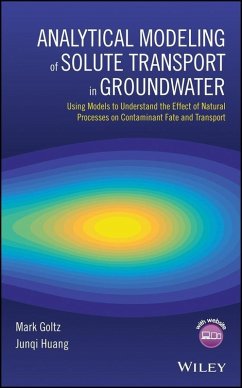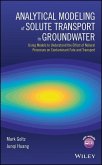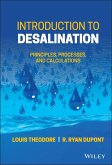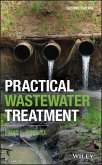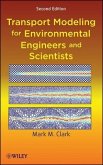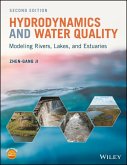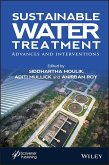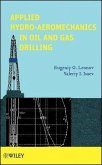Analytical Modeling of Solute Transport in Groundwater (eBook, PDF)
Using Models to Understand the Effect of Natural Processes on Contaminant Fate and Transport


Alle Infos zum eBook verschenken

Analytical Modeling of Solute Transport in Groundwater (eBook, PDF)
Using Models to Understand the Effect of Natural Processes on Contaminant Fate and Transport
- Format: PDF
- Merkliste
- Auf die Merkliste
- Bewerten Bewerten
- Teilen
- Produkt teilen
- Produkterinnerung
- Produkterinnerung

Hier können Sie sich einloggen

Bitte loggen Sie sich zunächst in Ihr Kundenkonto ein oder registrieren Sie sich bei bücher.de, um das eBook-Abo tolino select nutzen zu können.
Teaches, using simple analytical models how physical, chemical, and biological processes in the subsurface affect contaminant transport * Uses simple analytical models to demonstrate the impact of subsurface processes on the fate and transport of groundwater contaminants * Includes downloadable modeling tool that provides easily understood graphical output for over thirty models * Modeling tool and book are integrated to facilitate reader understanding * Collects analytical solutions from many sources into a single volume and, for the interested reader, shows how these solutions are derived from the governing model equations…mehr
- Geräte: PC
- mit Kopierschutz
- eBook Hilfe
- Größe: 3.63MB
![Analytical Modeling of Solute Transport in Groundwater (eBook, ePUB) Analytical Modeling of Solute Transport in Groundwater (eBook, ePUB)]() Mark GoltzAnalytical Modeling of Solute Transport in Groundwater (eBook, ePUB)88,99 €
Mark GoltzAnalytical Modeling of Solute Transport in Groundwater (eBook, ePUB)88,99 €![Introduction to Desalination (eBook, PDF) Introduction to Desalination (eBook, PDF)]() Louis TheodoreIntroduction to Desalination (eBook, PDF)143,99 €
Louis TheodoreIntroduction to Desalination (eBook, PDF)143,99 €![Practical Wastewater Treatment (eBook, PDF) Practical Wastewater Treatment (eBook, PDF)]() David L. RussellPractical Wastewater Treatment (eBook, PDF)111,99 €
David L. RussellPractical Wastewater Treatment (eBook, PDF)111,99 €![Transport Modeling for Environmental Engineers and Scientists (eBook, PDF) Transport Modeling for Environmental Engineers and Scientists (eBook, PDF)]() Mark M. ClarkTransport Modeling for Environmental Engineers and Scientists (eBook, PDF)143,99 €
Mark M. ClarkTransport Modeling for Environmental Engineers and Scientists (eBook, PDF)143,99 €![Hydrodynamics and Water Quality (eBook, PDF) Hydrodynamics and Water Quality (eBook, PDF)]() Zhen-Gang JiHydrodynamics and Water Quality (eBook, PDF)143,99 €
Zhen-Gang JiHydrodynamics and Water Quality (eBook, PDF)143,99 €![Sustainable Water Treatment (eBook, PDF) Sustainable Water Treatment (eBook, PDF)]() Sustainable Water Treatment (eBook, PDF)173,99 €
Sustainable Water Treatment (eBook, PDF)173,99 €![Applied Hydro-Aeromechanics in Oil and Gas Drilling (eBook, PDF) Applied Hydro-Aeromechanics in Oil and Gas Drilling (eBook, PDF)]() Eugeniy G. LeonovApplied Hydro-Aeromechanics in Oil and Gas Drilling (eBook, PDF)128,99 €
Eugeniy G. LeonovApplied Hydro-Aeromechanics in Oil and Gas Drilling (eBook, PDF)128,99 €-
-
-
Dieser Download kann aus rechtlichen Gründen nur mit Rechnungsadresse in A, B, BG, CY, CZ, D, DK, EW, E, FIN, F, GR, HR, H, IRL, I, LT, L, LR, M, NL, PL, P, R, S, SLO, SK ausgeliefert werden.
- Produktdetails
- Verlag: John Wiley & Sons
- Seitenzahl: 272
- Erscheinungstermin: 21. Februar 2017
- Englisch
- ISBN-13: 9781119300236
- Artikelnr.: 47757957
- Verlag: John Wiley & Sons
- Seitenzahl: 272
- Erscheinungstermin: 21. Februar 2017
- Englisch
- ISBN-13: 9781119300236
- Artikelnr.: 47757957
- Herstellerkennzeichnung Die Herstellerinformationen sind derzeit nicht verfügbar.
Preface xv
Acknowledgments xvii
About the Companion Website xix
1 Modeling 1
1.1 Introduction 1
1.2 Definitions 3
1.3 A Simple Model - Darcy's Law and Flow Modeling 3
1.3.1 Darcy's Law 3
1.3.2 Flow Equation 5
1.3.3 Example Application of Darcy's Law and the Flow Equation 8
1.3.4 Note of Caution - Know Model Assumptions and Applicable Conditions 9
1.3.5 Superposition (For a Fuller Discussion of Superposition Applied to
Groundwater Flow, See Reilly et al., 1984) 13
1.3.6 Example Application of the Principle of Superposition 13
References 16
2 Contaminant Transport Modeling 19
2.1 Introduction 19
2.2 Fate and Transport Processes 19
2.2.1 Advection 19
2.2.2 Dispersion 20
2.2.3 Sorption 22
2.2.4 Chemical and Biological Reactions 24
2.3 Advective-Dispersive-Reactive (ADR) Transport Equation 25
2.3.1 Reaction Submodel 27
2.3.2 Sorption Submodel 28
2.3.2.1 Linear Equilibrium 28
2.3.2.2 Rate-Limited Sorption 28
2.4 Model Initial and Boundary Conditions 29
2.4.1 Initial Conditions 30
2.4.2 Boundary Conditions 31
2.5 Nondimensionalization 32
References 35
3 Analytical Solutions to 1-D Equations 37
3.1 Solving the ADR Equation with Initial/Boundary Conditions 37
3.2 Using Superposition to Derive Additional Solutions 38
3.3 Solutions 40
3.3.1 AnaModelTool Software 40
3.3.2 Virtual Experimental System 41
3.4 Effect of Advection 41
3.5 Effect of Dispersion 43
3.6 Effect of Sorption 48
3.6.1 Linear, Equilibrium Sorption 48
3.6.2 Rate-Limited Sorption 51
3.6.2.1 First-Order Kinetics 51
3.6.2.2 Diffusion-Limited 57
3.7 Effect of First-Order Degradation 60
3.8 Effect of Boundary Conditions 64
3.8.1 Effect of Boundary Conditions on Breakthrough Curves 64
3.8.2 Volume-Averaged Resident Concentration Versus Flux-Averaged
Concentration 66
References 68
4 Analytical Solutions to 3-D Equations 71
4.1 Solving the ADR Equation with Initial/Boundary Conditions 71
4.2 Using Superposition to Derive Additional Solutions 72
4.3 Virtual Experimental System 72
4.4 Effect of Dispersion 73
4.5 Effect of Sorption 78
4.5.1 Linear, Equilibrium Sorption 78
4.5.2 Rate-Limited Sorption 80
4.6 Effect of First-Order Degradation 83
5 Method of Moments 87
5.1 Temporal Moments 87
5.1.1 Definition 87
5.1.2 Evaluating Temporal Moments 88
5.1.3 Temporal Moment Behavior 88
5.1.3.1 Advective-Dispersive Transport with First-Order Degradation and
Linear Equilibrium Sorption 88
5.1.3.2 Advective-Dispersive Transport with First-Order Degradation and
Rate-Limited Sorption 97
5.2 SpatialMoments 102
5.2.1 Definition 102
5.2.2 Evaluating Spatial Moments 103
5.2.3 Spatial Moment Behavior 104
5.2.3.1 Advective-Dispersive Transport with First-Order Degradation and
Linear Equilibrium Sorption 104
5.2.3.2 Advective-Dispersive Transport with First-Order Degradation and
Rate-Limited Sorption 105
References 120
6 Application of Analytical Models to Gain Insight into Transport Behavior
121
6.1 Contaminant Remediation 121
6.2 Borden Field Experiment 124
References 127
A Solution to One-Dimensional ADR Equation with First-Order Degradation
Kinetics Using Laplace Transforms 129
Reference 132
B Solution to One-Dimensional ADR Equation with Zeroth-Order Degradation
Kinetics Using Laplace Transforms 133
Reference 135
C Solutions to the One-Dimensional ADR in Literature 137
References 140
D User Instructions for AnaModelTool Software 141
E Useful Laplace Transforms 145
E.1 Laplace Transforms from van Genuchten and Alves (1982) 145
Reference 148
F Solution to Three-Dimensional ADR Equation with First-Order Degradation
Kinetics for an Instantaneous Point Source Using Laplace and Fourier
Transforms 149
References 151
G Solution to Three-Dimensional ADR Equation with Zeroth-Order Degradation
Kinetics for an Instantaneous Point Source Using Laplace and Fourier
Transforms 153
References 155
H Solutions to the Three-Dimensional ADR in Literature 157
References 160
I Derivation of the Long-Time First-Order Rate Constant to Model Decrease
in Concentrations at a Monitoring Well Due to Advection, Dispersion,
Equilibrium Sorption, and First-Order Degradation (Three-Dimensional
Infinite System with an Instantaneous Point Source) 161
J Application of Aris' Method of Moments to Calculate Temporal Moments 163
K Application of Modified Aris' Method of Moments to Calculate Spatial
Moments Assuming Equilibrium Sorption 165
L Application of Modified Aris' Method of Moments to Calculate Spatial
Moments Assuming Rate-Limited Sorption 167
L.1 Zeroth Spatial Moment 168
L.2 First Spatial Moment 168
L.3 Second Spatial Moment 168
M Derivation of Laplace Domain Solutions to a Model Describing Radial
Advective/Dispersive/Sorptive Transport to an Extraction Well 171
References 173
N AnaModelTool Governing Equations, Initial and Boundary Conditions, and
Source Code 175
N.1 Model 101 175
N.2 Model 102 176
N.3 Model 103 178
N.4 Model 104 179
N.5 Model 104M 180
N.6 Model 105 182
N.7 Model 106 184
N.8 Model 107 185
N.9 Model 108 187
N.10 Model 109 189
N.11 Model 201 191
N.12 Model 202 193
N.13 Model 203 195
N.14 Model 204 197
N.15 Model 205 200
N.16 Model 206 201
N.17 Model 207 203
N.18 Model 208 206
N.19 Model 301 207
N.20 Model 302 210
N.21 Model 303 212
N.22 Model 304 215
N.23 Model 305 217
N.24 Model 306 220
N.25 Model 401 222
N.26 Model 402 223
N.27 Model 403 225
N.28 Model 404 227
N.29 Model 405 229
N.30 Model 406 232
Index 235
Preface xv
Acknowledgments xvii
About the Companion Website xix
1 Modeling 1
1.1 Introduction 1
1.2 Definitions 3
1.3 A Simple Model - Darcy's Law and Flow Modeling 3
1.3.1 Darcy's Law 3
1.3.2 Flow Equation 5
1.3.3 Example Application of Darcy's Law and the Flow Equation 8
1.3.4 Note of Caution - Know Model Assumptions and Applicable Conditions 9
1.3.5 Superposition (For a Fuller Discussion of Superposition Applied to
Groundwater Flow, See Reilly et al., 1984) 13
1.3.6 Example Application of the Principle of Superposition 13
References 16
2 Contaminant Transport Modeling 19
2.1 Introduction 19
2.2 Fate and Transport Processes 19
2.2.1 Advection 19
2.2.2 Dispersion 20
2.2.3 Sorption 22
2.2.4 Chemical and Biological Reactions 24
2.3 Advective-Dispersive-Reactive (ADR) Transport Equation 25
2.3.1 Reaction Submodel 27
2.3.2 Sorption Submodel 28
2.3.2.1 Linear Equilibrium 28
2.3.2.2 Rate-Limited Sorption 28
2.4 Model Initial and Boundary Conditions 29
2.4.1 Initial Conditions 30
2.4.2 Boundary Conditions 31
2.5 Nondimensionalization 32
References 35
3 Analytical Solutions to 1-D Equations 37
3.1 Solving the ADR Equation with Initial/Boundary Conditions 37
3.2 Using Superposition to Derive Additional Solutions 38
3.3 Solutions 40
3.3.1 AnaModelTool Software 40
3.3.2 Virtual Experimental System 41
3.4 Effect of Advection 41
3.5 Effect of Dispersion 43
3.6 Effect of Sorption 48
3.6.1 Linear, Equilibrium Sorption 48
3.6.2 Rate-Limited Sorption 51
3.6.2.1 First-Order Kinetics 51
3.6.2.2 Diffusion-Limited 57
3.7 Effect of First-Order Degradation 60
3.8 Effect of Boundary Conditions 64
3.8.1 Effect of Boundary Conditions on Breakthrough Curves 64
3.8.2 Volume-Averaged Resident Concentration Versus Flux-Averaged
Concentration 66
References 68
4 Analytical Solutions to 3-D Equations 71
4.1 Solving the ADR Equation with Initial/Boundary Conditions 71
4.2 Using Superposition to Derive Additional Solutions 72
4.3 Virtual Experimental System 72
4.4 Effect of Dispersion 73
4.5 Effect of Sorption 78
4.5.1 Linear, Equilibrium Sorption 78
4.5.2 Rate-Limited Sorption 80
4.6 Effect of First-Order Degradation 83
5 Method of Moments 87
5.1 Temporal Moments 87
5.1.1 Definition 87
5.1.2 Evaluating Temporal Moments 88
5.1.3 Temporal Moment Behavior 88
5.1.3.1 Advective-Dispersive Transport with First-Order Degradation and
Linear Equilibrium Sorption 88
5.1.3.2 Advective-Dispersive Transport with First-Order Degradation and
Rate-Limited Sorption 97
5.2 SpatialMoments 102
5.2.1 Definition 102
5.2.2 Evaluating Spatial Moments 103
5.2.3 Spatial Moment Behavior 104
5.2.3.1 Advective-Dispersive Transport with First-Order Degradation and
Linear Equilibrium Sorption 104
5.2.3.2 Advective-Dispersive Transport with First-Order Degradation and
Rate-Limited Sorption 105
References 120
6 Application of Analytical Models to Gain Insight into Transport Behavior
121
6.1 Contaminant Remediation 121
6.2 Borden Field Experiment 124
References 127
A Solution to One-Dimensional ADR Equation with First-Order Degradation
Kinetics Using Laplace Transforms 129
Reference 132
B Solution to One-Dimensional ADR Equation with Zeroth-Order Degradation
Kinetics Using Laplace Transforms 133
Reference 135
C Solutions to the One-Dimensional ADR in Literature 137
References 140
D User Instructions for AnaModelTool Software 141
E Useful Laplace Transforms 145
E.1 Laplace Transforms from van Genuchten and Alves (1982) 145
Reference 148
F Solution to Three-Dimensional ADR Equation with First-Order Degradation
Kinetics for an Instantaneous Point Source Using Laplace and Fourier
Transforms 149
References 151
G Solution to Three-Dimensional ADR Equation with Zeroth-Order Degradation
Kinetics for an Instantaneous Point Source Using Laplace and Fourier
Transforms 153
References 155
H Solutions to the Three-Dimensional ADR in Literature 157
References 160
I Derivation of the Long-Time First-Order Rate Constant to Model Decrease
in Concentrations at a Monitoring Well Due to Advection, Dispersion,
Equilibrium Sorption, and First-Order Degradation (Three-Dimensional
Infinite System with an Instantaneous Point Source) 161
J Application of Aris' Method of Moments to Calculate Temporal Moments 163
K Application of Modified Aris' Method of Moments to Calculate Spatial
Moments Assuming Equilibrium Sorption 165
L Application of Modified Aris' Method of Moments to Calculate Spatial
Moments Assuming Rate-Limited Sorption 167
L.1 Zeroth Spatial Moment 168
L.2 First Spatial Moment 168
L.3 Second Spatial Moment 168
M Derivation of Laplace Domain Solutions to a Model Describing Radial
Advective/Dispersive/Sorptive Transport to an Extraction Well 171
References 173
N AnaModelTool Governing Equations, Initial and Boundary Conditions, and
Source Code 175
N.1 Model 101 175
N.2 Model 102 176
N.3 Model 103 178
N.4 Model 104 179
N.5 Model 104M 180
N.6 Model 105 182
N.7 Model 106 184
N.8 Model 107 185
N.9 Model 108 187
N.10 Model 109 189
N.11 Model 201 191
N.12 Model 202 193
N.13 Model 203 195
N.14 Model 204 197
N.15 Model 205 200
N.16 Model 206 201
N.17 Model 207 203
N.18 Model 208 206
N.19 Model 301 207
N.20 Model 302 210
N.21 Model 303 212
N.22 Model 304 215
N.23 Model 305 217
N.24 Model 306 220
N.25 Model 401 222
N.26 Model 402 223
N.27 Model 403 225
N.28 Model 404 227
N.29 Model 405 229
N.30 Model 406 232
Index 235
